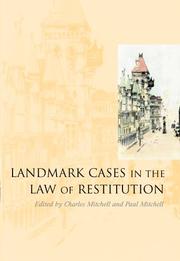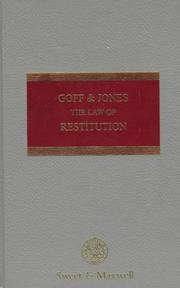| Listing 1 - 10 of 499 | << page >> |
Sort by
|
Book
ISBN: 0198254342 Year: 1991 Publisher: Oxford : Clarendon press,
Abstract | Keywords | Export | Availability | Bookmark
 Loading...
Loading...Choose an application
- Reference Manager
- EndNote
- RefWorks (Direct export to RefWorks)
Book
ISBN: 042116560X Year: 1978 Publisher: London : Sweet and Maxwell,
Abstract | Keywords | Export | Availability | Bookmark
 Loading...
Loading...Choose an application
- Reference Manager
- EndNote
- RefWorks (Direct export to RefWorks)
Book
Abstract | Keywords | Export | Availability | Bookmark
 Loading...
Loading...Choose an application
- Reference Manager
- EndNote
- RefWorks (Direct export to RefWorks)
Book
Abstract | Keywords | Export | Availability | Bookmark
 Loading...
Loading...Choose an application
- Reference Manager
- EndNote
- RefWorks (Direct export to RefWorks)

ISBN: 1841135887 9781841135885 Year: 2006 Publisher: Oxford Hart Publishing
Abstract | Keywords | Export | Availability | Bookmark
 Loading...
Loading...Choose an application
- Reference Manager
- EndNote
- RefWorks (Direct export to RefWorks)
Book
Year: 1614 Publisher: [London] : Printed [by G. Eld] for Thomas Thorp,
Abstract | Keywords | Export | Availability | Bookmark
 Loading...
Loading...Choose an application
- Reference Manager
- EndNote
- RefWorks (Direct export to RefWorks)
eebo-0018
Book
ISBN: 9026809816 Year: 1978 Publisher: Deventer Kluwer
Abstract | Keywords | Export | Availability | Bookmark
 Loading...
Loading...Choose an application
- Reference Manager
- EndNote
- RefWorks (Direct export to RefWorks)
Book
ISBN: 1472560035 1281082694 9786611082697 1847313531 Year: 2007 Publisher: Oxford Portland, Oregon Hart Publishing
Abstract | Keywords | Export | Availability | Bookmark
 Loading...
Loading...Choose an application
- Reference Manager
- EndNote
- RefWorks (Direct export to RefWorks)
Restitution for wrongs', or 'restitutionary damages', is the judicial award which compels the wrongdoer to give up to the victim the benefit obtained through the perpetration of the wrong, independently of any loss suffered by the victim. The establishment of a civil trial in Roman law, which left compensation as the main response, and a widespread, loss-centred interpretation of the Aristotelian theory of corrective justice explain, but do not justify the difficulties encountered by modern attempts to account for restitutionary damages. Mistakes in the classification of this institution have complicated the picture. To overcome some of these problems, this study considers the basic structure of restitutionary damages from different angles. In part one, the topic is analysed from a comparative perspective. Although the focus remains on English law, the German, the Italian and the Roman jurisdictions provide research data which, in part two, support the development of a theory of restitution for wrongs as corrective justice
Book
ISBN: 1847316956 1472559878 1280808349 9786610808342 1847310931 Year: 2006 Publisher: Oxford Portland, Oregon Hart Publishing
Abstract | Keywords | Export | Availability | Bookmark
 Loading...
Loading...Choose an application
- Reference Manager
- EndNote
- RefWorks (Direct export to RefWorks)
It is now well established that the law of unjust enrichment forms an important and distinctive part of the English law of obligations. Restitutionary awards for unjust enrichment and for wrongdoing are clearly recognised for what they are. But these are recent developments. Before the last decade of the twentieth century the very existence of a separate law of unjust enrichment was controversial, its scope and content matters of dispute. In this collection of essays, a group of leading scholars look back and reappraise some of the landmark cases in the law of restitution. They range from the early seventeenth century to the mid-twentieth century, and shed new light on some classic decisions. Some argue that the importance of their case has been overstated; others, that it has been overlooked, or misconceived. All persuasively invite the reader to think again about some well-known authorities. The book is an essential resource for anyone, scholar, student or practitioner, with an interest in this fascinating area of the law

ISBN: 0421608005 Year: 1998 Publisher: London Sweet and Maxwell
Abstract | Keywords | Export | Availability | Bookmark
 Loading...
Loading...Choose an application
- Reference Manager
- EndNote
- RefWorks (Direct export to RefWorks)
Restitution --- -Restitution --- -Restitution -
| Listing 1 - 10 of 499 | << page >> |
Sort by
|

 Search
Search Feedback
Feedback About UniCat
About UniCat  Help
Help News
News